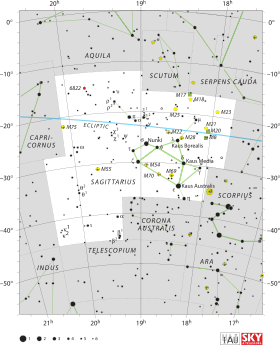Xi1 Sagittarii
Xi1 Sagittarii (ξ1 Sagittarii) is a solitary,[11] blue-white hued star in the zodiac constellation of Sagittarius. It is visible to the naked eye with an apparent visual magnitude of +5.06.[2] Based upon a small annual parallax shift of 1.58 mas as seen from Earth,[1] this system is located roughly 2,100 light years from the Sun.
 | |
| Observation data Epoch J2000.0 Equinox J2000.0 (ICRS) | |
|---|---|
| Constellation | Sagittarius |
| Right ascension | 18h 57m 20.47670s[1] |
| Declination | −20° 39′ 22.8539″[1] |
| Apparent magnitude (V) | +5.06[2] |
| Characteristics | |
| Spectral type | B9/A0 Ib[3] |
| U−B color index | −0.14[2] |
| B−V color index | +0.12[2] |
| Astrometry | |
| Proper motion (μ) | RA: −1.46[1] mas/yr Dec.: −5.75[1] mas/yr |
| Parallax (π) | 1.58 ± 0.26[1] mas |
| Distance | approx. 2,100 ly (approx. 600 pc) |
| Absolute magnitude (MV) | −3.92[4] |
| Details | |
| Mass | 7.8±0.1[5] M☉ |
| Radius | 15[6] R☉ |
| Luminosity | 2,753[7] L☉ |
| Surface gravity (log g) | 2.3[8] cgs |
| Temperature | 9,400[8] K |
| Metallicity [Fe/H] | −0.20[8] dex |
| Rotational velocity (v sin i) | 10[9] km/s |
| Age | 39.8±4.9[5] Myr |
| Other designations | |
| Database references | |
| SIMBAD | data |
This is a massive supergiant star[6] with a stellar classification of B9/A0 Ib.[3] With an estimated 7.8[5] times the mass of the Sun and an age of about 40[5] million years it has depleted the hydrogen at its core, causing it to expand to about 15 times the Sun's radius.[6] It is radiating 2,753[7] times the Sun's luminosity from its photosphere at an effective temperature of about 9,400 K.[8]
References
- van Leeuwen, F. (2007), "Validation of the new Hipparcos reduction", Astronomy and Astrophysics, 474 (2): 653–664, arXiv:0708.1752, Bibcode:2007A&A...474..653V, doi:10.1051/0004-6361:20078357.
- Fernie, J. D. (1983), "New UBVRI photometry for 900 supergiants", Astrophysical Journal Supplement Series, 52: 7, Bibcode:1983ApJS...52....7F, doi:10.1086/190856.
- Houk, Nancy; Smith-Moore, M. (1978), Michigan catalogue of two-dimensional spectral types for the HD stars, 4, Ann Arbor: Dept. of Astronomy, University of Michigan, Bibcode:1988mcts.book.....H.
- Anderson, E.; Francis, Ch. (2012), "XHIP: An extended hipparcos compilation", Astronomy Letters, 38 (5): 331, arXiv:1108.4971, Bibcode:2012AstL...38..331A, doi:10.1134/S1063773712050015.
- Tetzlaff, N.; et al. (January 2011), "A catalogue of young runaway Hipparcos stars within 3 kpc from the Sun", Monthly Notices of the Royal Astronomical Society, 410 (1): 190–200, arXiv:1007.4883, Bibcode:2011MNRAS.410..190T, doi:10.1111/j.1365-2966.2010.17434.x.
- Venn, Kim A. (August 1995), "Atmospheric Parameters and LTE Abundances for 22 Galactic, A-Type Supergiants", Astrophysical Journal Supplement, 99: 659, Bibcode:1995ApJS...99..659V, doi:10.1086/192201.
- McDonald, I.; et al. (2012), "Fundamental Parameters and Infrared Excesses of Hipparcos Stars", Monthly Notices of the Royal Astronomical Society, 427 (1): 343–57, arXiv:1208.2037, Bibcode:2012MNRAS.427..343M, doi:10.1111/j.1365-2966.2012.21873.x.
- Soubiran, C.; Le Campion, J.-F.; Cayrel de Strobel, G.; Caillo, A. (June 2010), "The PASTEL catalogue of stellar parameters", Astronomy and Astrophysics, 515: A111, arXiv:1004.1069, Bibcode:2010A&A...515A.111S, doi:10.1051/0004-6361/201014247.
- Royer, F.; et al. (January 2012), "Rotational velocities of A-type stars. I. Measurement of v sin i in the southern hemisphere", Astronomy and Astrophysics, 381: 105–121, arXiv:astro-ph/0110490, Bibcode:2002A&A...381..105R, doi:10.1051/0004-6361:20011422.
- "ksi01 Sgr". SIMBAD. Centre de données astronomiques de Strasbourg. Retrieved 2017-07-05.
- Eggleton, P. P.; Tokovinin, A. A. (September 2008), "A catalogue of multiplicity among bright stellar systems", Monthly Notices of the Royal Astronomical Society, 389 (2): 869–879, arXiv:0806.2878, Bibcode:2008MNRAS.389..869E, doi:10.1111/j.1365-2966.2008.13596.x.
This article is issued from Wikipedia. The text is licensed under Creative Commons - Attribution - Sharealike. Additional terms may apply for the media files.